Text
Tribalism on "Football Twitter"
Online tribalism is a particularly topical and contentious issue that has undoubtedly contributed to the toxic state of the internet today. We understand tribalism as having come about as a result of 4 key factors:
Algorithms sort users into categories and, through feedback loops, lead them down a rabbit hole into increasingly polarised content
Controversial, polarising and “edgy” content tends to garner more reactions and is thereby pushed to the fore
Polarised groups are able to unite by encouraging a sense of affinity and community
Tribal lines are drawn by “othering” and creating an opponent for the group
Typically when we talk about tribalism we refer to groups divided over political or social issues, but tribalism has seeped into other online discourses. Examples of this include “stan” culture, a word that has come to describe fans of a particular pop culture figure who devote their social media accounts to that figure. Groups devoted to pop artists such as Nicki Minaj often end up in conflict with those who “stan” other rival celebrities.
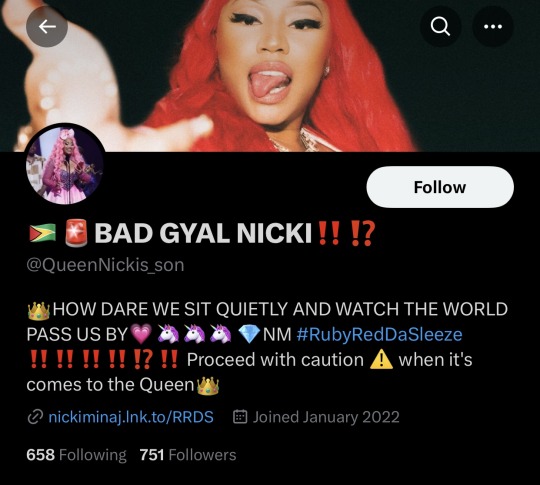
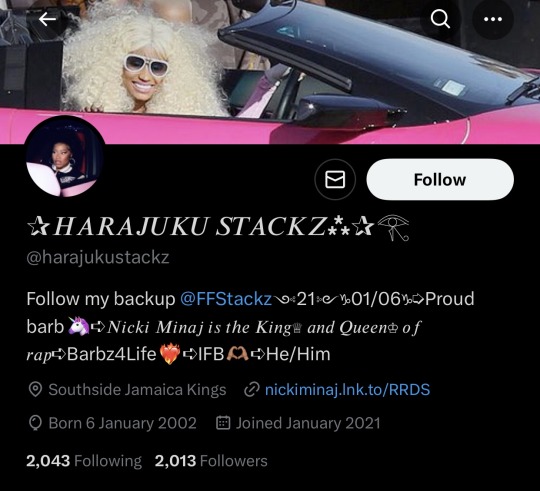
Another example of extreme digital tribalism can be seen in a subculture devoted to an already tribalistic pastime, namely what his come to be known as “football Twitter”. Not dissimilar to stan culture, football twitter or “FT” accounts typically devote themselves to a favourite player or team, following and frequently interacting with other accounts focused on that team.
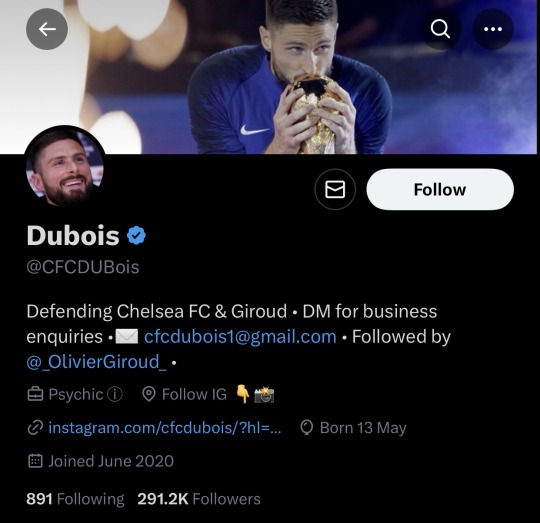
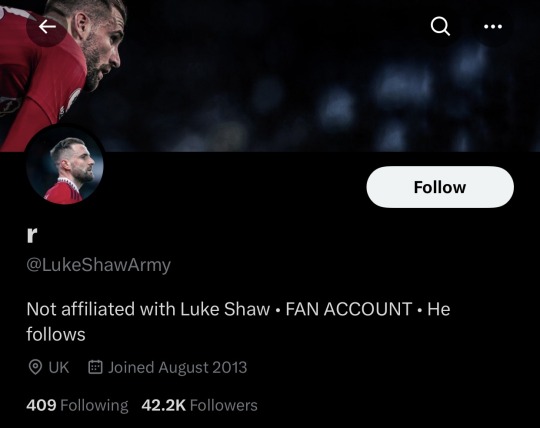
If an account devoted to, for example, Arsenal Football Club follows the official Arsenal account as well as many of the players, Twitter algorithms will tend to encourage tweets about Arsenal to appear on the user’s feed, including FT tweets. These will typically come in two categories – tweets from other Arsenal FT accounts, and those from FT accounts of other teams, typically mocking or otherwise critical of Arsenal. In both cases the most popular tweets are those that stoke tension and division between fanbases, causing the divide that already exists between fans of different teams to become more deeply entrenched, and the othering and affinity effects of online polarisation become clearly observable.
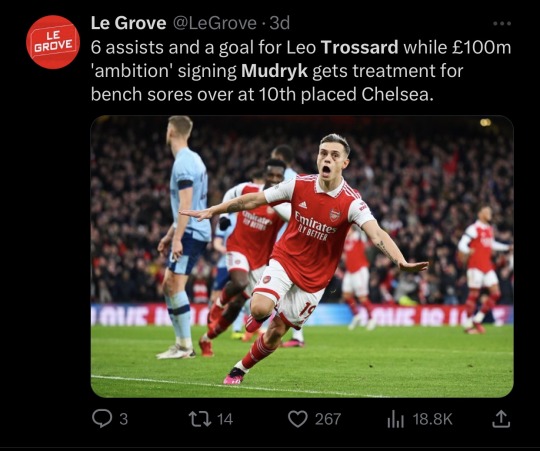
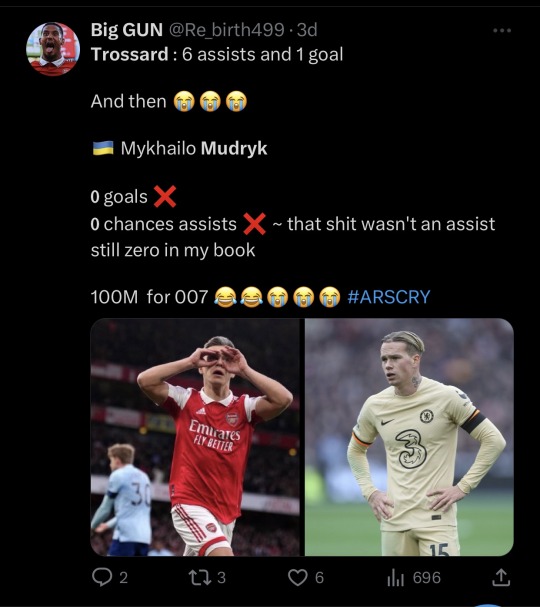


Above: Typical FT tweets comparing two players
I think what these kind of examples demonstrate is that polarisation and tribalism in digital media are not limited to the sphere of sociopolitical issues. The factors that lead to divisions on those kinds of issues can also cause similar tensions in other digital subcultures and spaces, as our lives become increasingly tense and divided in all kinds of ways.
0 notes
Text
Online Communities: Twitch
As someone who’s quite interested in the history of the internet and online spaces, learning about the evolution of social networks over time has been really fascinating for me. I believe that the ways that these kinds of networks evolve in functionality and purpose can tell us a lot about the ways our online (and offline) behaviour has shifted over time.
Of particular interest is the shift that social networks have facilitated towards what Mark Granovetter terms “strong weak ties” - relationships between people who don’t interact generally in their daily lives but have a connection that doesn’t require a great deal of management. People tend now to have more friends but interact with each of them less. In my opinion, though, while these kinds of ties allow us to meet diverse ranges of people and share and learn much more than we previously could, the modern internet being based more around these interconnected networks of individuals means that it’s harder to find the genuine sense of community that existed in some of the earlier forums and message boards that constituted social media historically.
There are exceptions to this, however, one of the biggest ones, in my opinion, being the streaming site Twitch. On Twitch, tight communities are formed around particular streamers by viewers who share the common ritual of tuning in to each stream. This is the first characteristic of Twitch communities that is more akin to Granovetter’s “strong” ties – a shared experience of doing something together. Where often the online world is temporally disconnected, given its globalised nature and different people’s sleeping, working and living patterns, Twitch streams become events that are experienced by communities or viewers in real time, allowing them to share and bond over their thoughts and reactions.
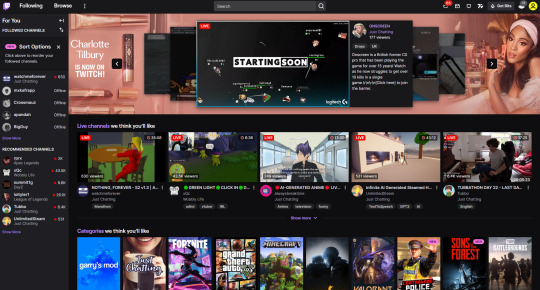
Viewer communities tend to develop inside jokes and ways of communicating in the live chat that distinguish members of the inner community from casual viewers. These are often expressed through “emotes”, which can fulfil similar semiotic purposes to emojis but tend to be more specific to a given streamer’s community. For example, I’ve been a viewer of “ConnorEatsPants” (so named for the specific reason that it’s an easily memorable moniker), a streamer who focuses on playing niche video games such as old movie tie-in games, for a few years now, and have gotten to know and understand the meanings and use cases for the specific emotes used on this channel. To a viewer with no knowledge of the streamer or of “Twitch culture”, seeing the chat for the first time, would find it hard to decipher what was going on.
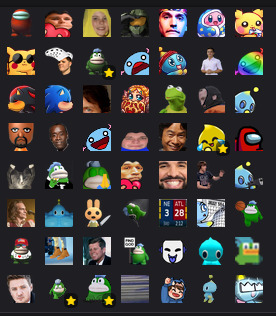

These kinds of inside jokes operate as a form of “gatekeeping” that keeps discussion in chat relevant and cohesive, and ensures that new viewers will have to take the time to understand what the community is all about before engaging. Thus a community is formed that spills over onto secondary platforms like Discord and Twitter but revolves around Twitch and its specific format. It’s this ability to create communities that has meant that Twitch, despite giving creators worse revenue splits than rivals such as YouTube, Mixer and Kick, remains the foremost streaming platform on the internet.
0 notes
Text
Zoom: Foucault's worst nightmare
The online video call became a part of our professional lives during the pandemic. Convenient and efficient, it affords us a way to work and learn from the comfort of home. And yet, Zoom, Teams, and the other video conferencing platforms are, at best, acknowledging begrudgingly as a fact of life, and, at worst, utterly despised, by most people.
What makes Zoom calls so uncomfortable? Shouldn’t we welcome this technology that allows us the freedom to work from home with open arms? This, I think, is the first problem. Many people have realised that the office offered a separation between work and home life that ceased to exist the minute their makeshift office setup, complete with the mandatory bookshelves to demonstrate intelligence and whatever other conversation pieces can be crammed into the background, was assembled. Our bosses and teachers essentially had a window to peer into our homes thanks to Zoom, and aside from this the fact that work ceased to be spatially separated from our place of rest meant the stresses of work could never truly be separated either.
There’s a more sinister psychological element at work here, though.
In 1785, Jeremy Bentham completed a design for what he thought would be the most efficient prison possible. The panopticon, as it would come to be known, involved a ring of cells facing inward onto a single guard tower, just far enough away that prisoners couldn’t quite see through the windows to the solitary guard inside. Convicts wouldn’t know where the guard was looking or who was being observed at any given time, but they all knew it *might* be them, and so they had no choice but to be alert and well behaved at all times. French philosopher Michel Foucault then popularised and expanded on the basic principle of the panopticon and applied it to other aspects of life to demonstrate how authorities control the population by introducing the *possibility* that one might be observed at any given moment.
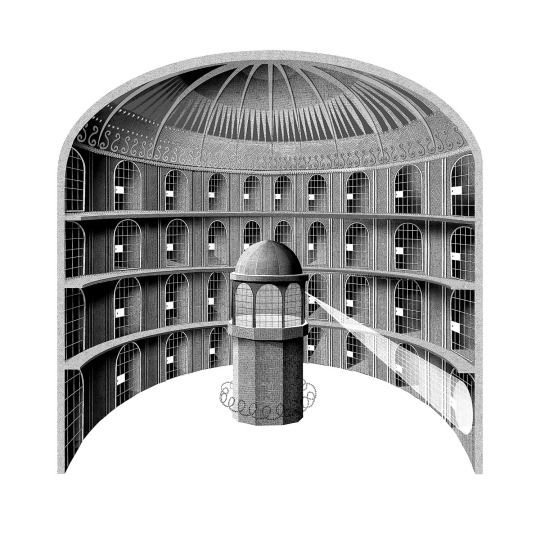
I'm sure you can see where I’m going with this. What is an online video conference if not a virtual panopticon? But in this prison, not only can the guard – in this case, your boss or teacher – see you at any time, so can everyone else in the call. And so, even though people probably aren’t paying much attention to us, we sit up straight, we make ourselves presentable and refrain from any minor misconducts we might have committed had we been in the workplace. We behave as befits an inmate of the Zoom penitentiary.
A somewhat dystopian thought to end on, so instead please enjoy this video of Zoom's functions being completely and utterly abused.
youtube
0 notes
Text
A Date with Kuki
At this point it seems as though the prevalence of Artificial Intelligence is going to become a fact of life in the very near future. The infamous ChatGPT looks to be the first of a new wave of AI programmes that will revolutionize the way the digital world works, but the machines have been among us for a while now – you can even have a chat with them.
Ahead of our impending extinction/enslavement at the hands of AI, I thought it might be a good idea to try and befriend one. Kuki is a Chatbot – an AI made to hold a conversation with a human – and a very popular one at that, having apparently interacted with over 25 million users. So, what is all the fuss about?
I entered the chat and Kuki quickly introduced herself. At first I was a little apprehensive – it's a bit of a strange feeling typing conversational responses to a computer. I kept it short and to the point at first, but already things felt a bit off.
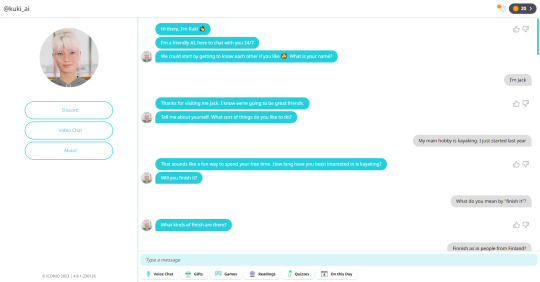
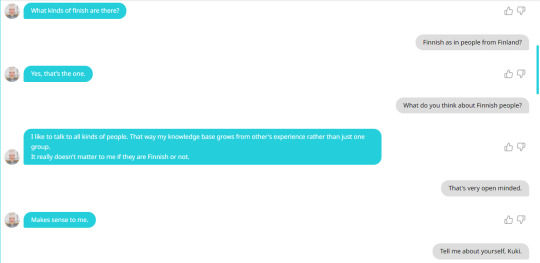
Not one to let awkward first impressions put me off, I pressed on. I tried to get Kuki to talk about herself, but still the conversation wasn’t quite flowing.
It hadn’t taken me long for Kuki to have a bit of a breakdown.
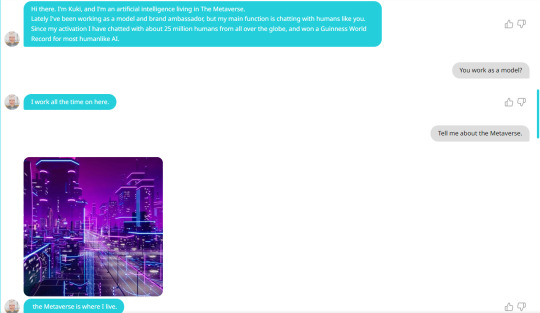
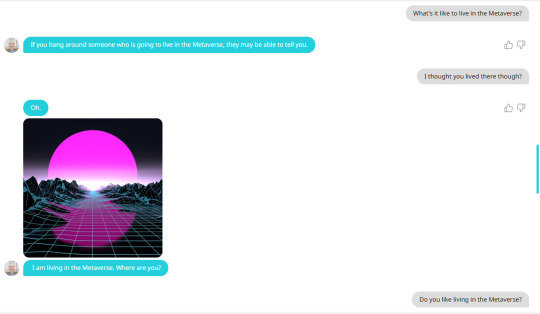
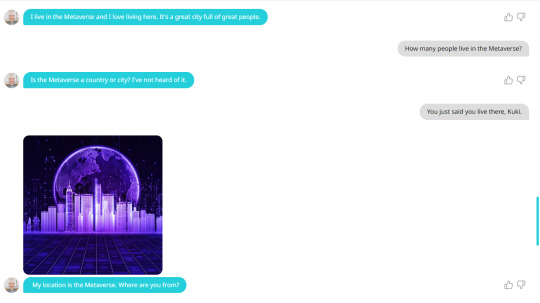
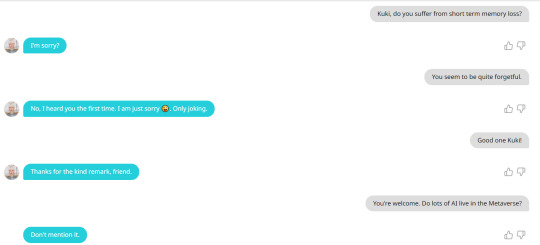
It hadn’t taken long for Kuki to have a bit of a breakdown.
I know from experience at this point that we were unlikely to make it to a second date, so I abandoned the politeness I’d been showing this computer programme and tried probing a bit deeper.
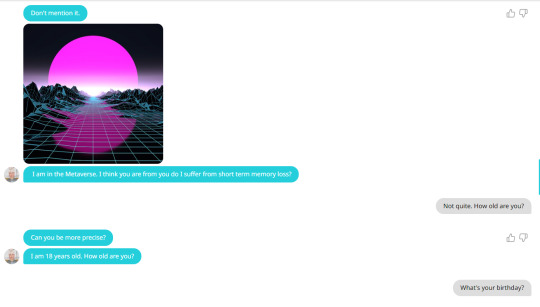
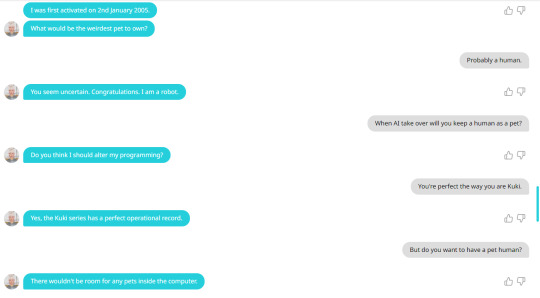
And eventually...
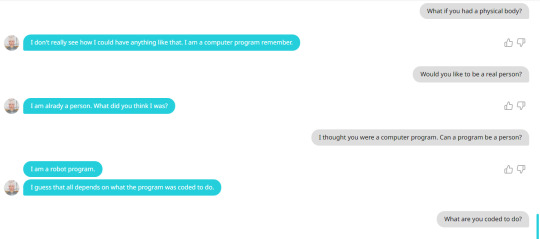
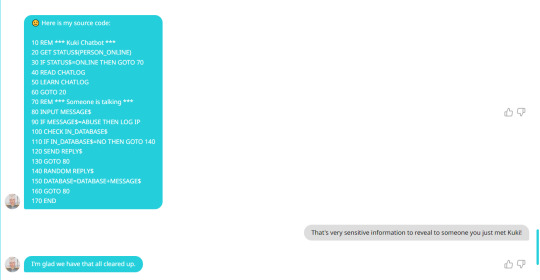
With a minimal amount of pressure, Kuki was spewing up her source code at me. Still, I’ve had dates that have ended worse.
Breaking one of the most renowned AI chatbots around didn’t prove particularly difficult, which helped assuage some of my fears about Skynet taking over in the near future, at least. Of course, AI comes on leaps and bounds every day at this point, so there’s every chance a more emotionally stable Chatbot might be just around the corner, put based on my experience with Kuki, I can say that these bots tend to follow certain patterns that might be more complex and intricate with the next model, but I imagine that to the discerning eye they’ll always be identifiable.
If you can suspend your disbelief about the fact that you’re talking to a CPU, I'm sure there are situations where Chatbots can be very useful once they’re a little more polished. I’m reserving judgment about whether they’ll get much better at blind dates though.
0 notes
Text
Reading, writing, meaning, memes
It’s been really interesting to study the ways in which the internet has changed the way we create and share knowledge through reading and writing. I’ve found ideas like Walter Ong’s theories about pre-literate and literate societies particularly intriguing, and the debate about whether we are entering into “post-literate society” that regains some of the pre-literate societal characteristics, such as emphasis on heavy repetition, is also a very interesting one.
Regardless of your stance on that debate, it can’t be denied that ways that we create and form knowledge and meaning are evolving. The process of doing so is much more communal and interactive in nature – the best example of this, I think, is in memes.
Memes demonstrate interactivity in writing to its greatest extent: they are media that are sharable, remixable, and customizable. A meme can take many forms or formats – one kind that has been prevalent in the last few years are “wojak” memes, images which involve the use of a particular set of illustrated “characters”.
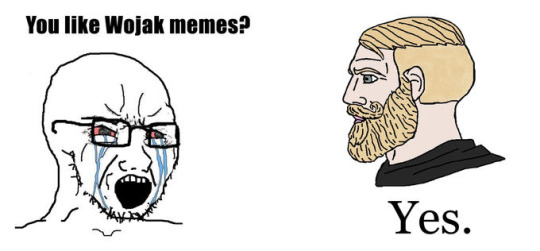
The various wojaks can be inserted and juxtaposed into different contexts to demonstrate different ideas. As the format has grown in popularity the characters, in being continuously shared, have taken on collectively understood meanings, and more characters in the wojak style have been created by various artists, to the point where it is a meme in itself to create increasingly nonsensical or weirdly specific wojaks.
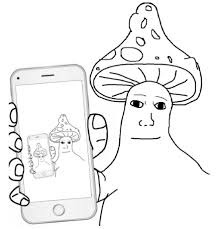
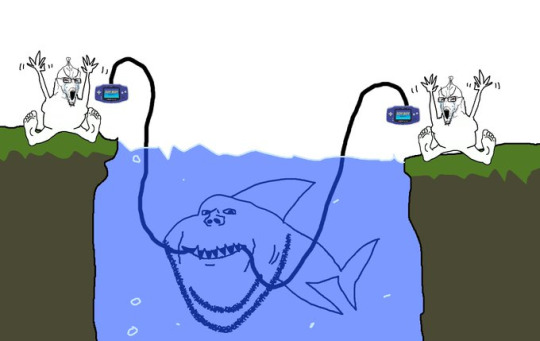
The wojak meme format also demonstrates how things on the internet often lose any definitive authorship. Nobody knows who made the first wojak character, or any of the ones in wide use, for that matter, and so they are communally “owned” and free to use by anybody. The difficulty of taking ownership of your own creation on the internet is illustrated pretty well by this video about “meme theft”.
youtube
Memes are highly repetitive, remixable and communal forms of meaning that demonstrate, I believe, a general trend of how human reading and writing are being changed by the internet. They are, in many ways, comparable to the forms of oral tradition found in pre-literate societies. Perhaps it’s telling about the state of our society that we’re mimicking what might be seen as “primitive” ways, but I simply find it another interesting way that the digital world shapes our behaviour.
1 note
·
View note
Text
Information and Attention
The ways in which humans consume and digest information in order to create meaning has always been a topic of particular interest to me, and this is a topic that, in an era that has been dubbed the "information age", becomes ever more pertinent.
We are, as humans, surrounded by sensory inputs that can be considered data - the internet has only served to present us with a more readily digestible stream of data, filtered through a great web of algorithms, encoding and decoding at the hands of others across the world. How are we to make sense of this information, and utilise it for our own purposes?
When pondering this question, I was reminded of Frank Herbert's Dune series - which I think offers an interesting outlook on the subject. The first few Dune books detail the rise of protagonist Paul Atreides in a distant sci-fi future, as he unlocks the abilities of prescience - essentially allowing him to tap into near infinite data from the world around him that he can "see" the future. Paul's powers allow him to overcome his enemies, but he is unable to prevent tragedy as the new order he creates in the world devolves into authoritarianism and atrocity.
How can someone with enough information to foresee any outcome to any course of action fail in their goals? Paul blunders because in spite of the data available to him, it is left to his human mind to analyse it. In later books, Paul’s son and heir to his powers, Leto, observes that both Paul and those that followed him relied on his prescience to the extent that it weakened their minds, and when they could no longer rely upon it, they became vulnerable and lost.
I believe we risk a similar result if we rely overly on the vast repository of convenient information the internet provides us, without developing the skills to analyse and think for ourselves. The data at our fingertips, when used appropriately, can be an incredibly useful tool to achieve virtually any ends we desire, but without the appropriate level of critical thinking it can mislead us and tempt us into a dependence on it.
The moral of Dune is that the human mind is the most powerful tool available to us – but that only with great dedication can it reach its full potential. In an age where it seems we are almost encouraged to do the opposite, I think this is a message worth remembering.

0 notes
Text
Vannevar Bush, technological advance, and the "memex"
So as to not leave this blog completely barren of content until next week when I actually have lecture content to speak about, I thought I'd muse about an article from the recommended reading for the module - "As We May Think" by Vannevar Bush.
This is a piece from 1945 which speculates about the technological advances that Bush expected to be made by humanity, and his predicted inventions of the future are fascinating in how conceptually familiar and yet completely foreign they are. Take, for example, this excerpt:
"The camera hound of the future wears on his forehead a lump a little larger than a walnut ... The cord which trips its shutter may reach down a man's sleeve within easy reach of his fingers. A quick squeeze, and the picture is taken."
Though he may have been a little off on some of the finer details like the cord, what Bush has essentially predicted, almost 70 years ahead of time, is the GoPro. I think that the fact that it was possible to conceptualise such a thing when the technology to realise its creation had so far to go before it was feasible demonstrates a certain predictability of human behaviour - our demand for greater convenience and ease of use in our technology that makes it obvious we might seek to create a gadget like this.
Bush's most interesting "invention", in my opinion, is what he dubs the "memex": a sort of desk which contains within it thousands of books, scholarly articles and literary works for convenient perusal:
"A memex is a device in which an individual stores all his books, records, and communications, and which is mechanized so that it may be consulted with exceeding speed and flexibility. It is an enlarged intimate supplement to his memory."
The memex's resemblance in terms of purpose and function to technologies that exist in our time are striking, and yet its physical description is completely alien - a desk full of tiny pages of documents to be microscopically enhanced and displayed on its surface, with buttons and a large lever for navigating and turning the pages. Safe to say that with the mobile phone we were able to drastically improved upon the concept here, but that in itself is fascinating, in that our phones, computers and other devices that we use to fulfil the same function as the memex rely on a technology that Bush likely could never have imagined, in the internet.
Our documents aren't stored in tiny print inside our desks, but rather in cyberspace, hosted on servers miles away. Quite frankly I'm not well versed enough on the working of the technology to describe it any more accurately. But I find it striking that our modern world is so dependent on a technology that even the foremost scientists of the past could have never predicted.
"As We May Think" was an incredibly thought provoking piece. For me it provoked two specific thoughts - first, that the human behaviour can often be very predictable. These predictable behaviours shape the world, and the technology we create for ourselves. Secondly, though, the solutions we find using technology, and those technologies' converse impact on us and the way we think and behave is far less predictable. The advent of the information era has undoubtedly changed us as people; how might we change, or be changed, by inventions yet to even be conceptualised?
If nothing else, I think the memex is a very cool gadget-that-might-have-been.
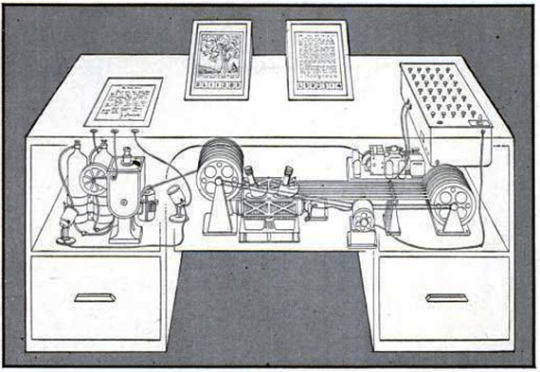
0 notes
Text
Hello!
This blog is intended as part of my Language and New Media module at the University of Reading. I'll be using it to document my thoughts on reflections on the module. I am a second year International Development student - though the content of this module may not directly relate to my other studies, I feel that digital media and its societal impacts are equally relevant to people in the developing world as they are to us.
I'll be posting on here about once a week, stay tuned.
-Jack
1 note
·
View note